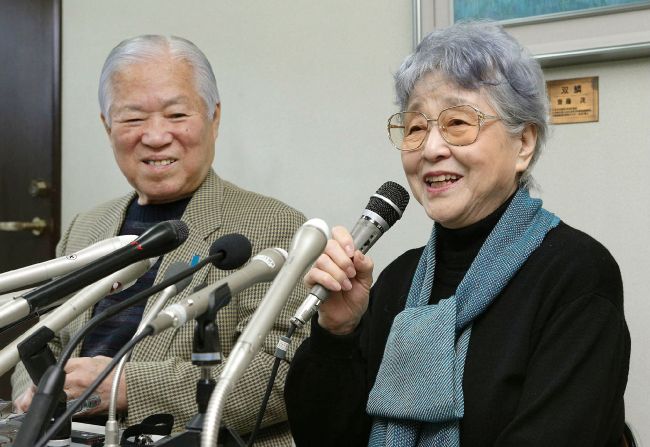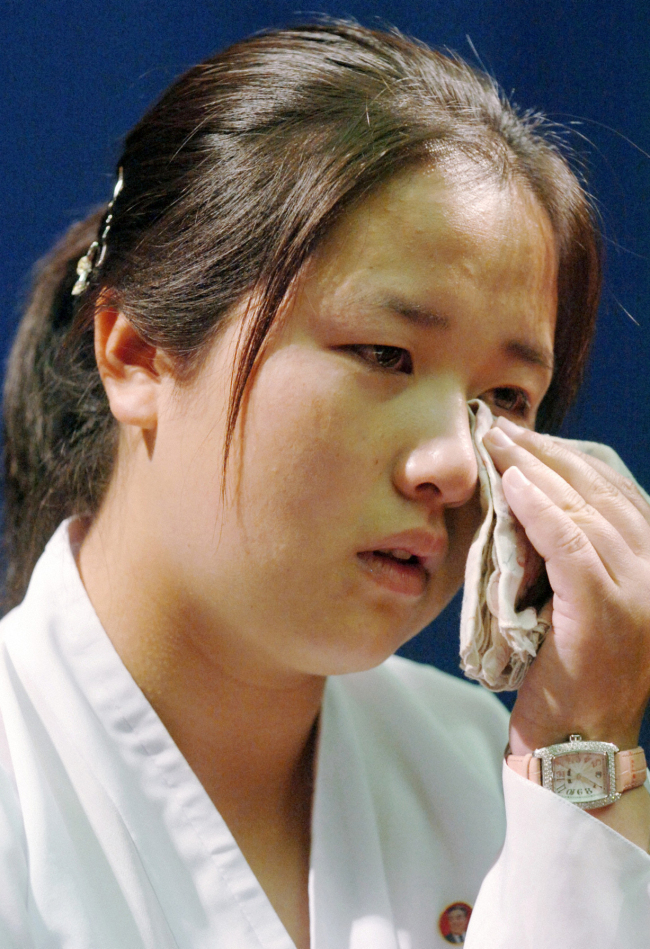TOKYO (AFP) ― The ageing parents of a Japanese woman who was kidnapped and taken to North Korea as a schoolgirl and allegedly died there have met her daughter for the first time, Japan’s Foreign Ministry said Sunday.
Pyongyang admitted in 2002 that it abducted a dozen Japanese nationals in the 1970s and 1980s and eight of them had died, including Megumi Yokota who was only 13 years old when she was kidnapped on her way back from school by North Korean agents in 1977.
Yokota’s parents spent five days last week with their granddaughter, 26-year-old Kim Eun-gyong, and her family in the Mongolian capital Ulan Bator, the Foreign Ministry said without offering details.
The Japanese ministry said their meeting, arranged by the two quarrelling governments, marked a positive development as it seeks the reopening of long-stalled bilateral talks with North Korea, according to Kyodo news agency.
The two countries, which have no diplomatic relations, relaunched Red Cross talks on humanitarian issues this month following a two-year break.
Yokota, who North Korea claims killed herself in 1994, became a symbol of a bitter bilateral row over Pyongyang’s abduction of Japanese nationals in the 1970s and 1980s, mainly aimed at training North Korean spies in Japanese language and customs.
Pyongyang admitted in 2002 that it abducted a dozen Japanese nationals in the 1970s and 1980s and eight of them had died, including Megumi Yokota who was only 13 years old when she was kidnapped on her way back from school by North Korean agents in 1977.
Yokota’s parents spent five days last week with their granddaughter, 26-year-old Kim Eun-gyong, and her family in the Mongolian capital Ulan Bator, the Foreign Ministry said without offering details.
The Japanese ministry said their meeting, arranged by the two quarrelling governments, marked a positive development as it seeks the reopening of long-stalled bilateral talks with North Korea, according to Kyodo news agency.
The two countries, which have no diplomatic relations, relaunched Red Cross talks on humanitarian issues this month following a two-year break.
Yokota, who North Korea claims killed herself in 1994, became a symbol of a bitter bilateral row over Pyongyang’s abduction of Japanese nationals in the 1970s and 1980s, mainly aimed at training North Korean spies in Japanese language and customs.

Tokyo has refused to accept Pyongyang’s explanation of Yokota’s death.
Yokota’s parents ― father Shigeru, 81, and mother Sakie, 78 ― had previously refused to meet Kim for fear of being used as a propaganda tool by Pyongyang to establish their daughter’s death as fact.
But in the Ulan Bator meeting, Kim reiterated to the Yokotas that her mother was dead, Jiji Press quoted Japanese government sources as saying.
Megumi Yokota was abducted by North Korean agents in the city of Niigata by the East Sea and taken to North Korea by boat.
In North Korea’s 2002 admission that it had abducted a dozen Japanese nationals, it said, without presenting conclusive evidence, that eight of them including Yokota were dead.
The Japanese government has demanded that North Korea come clean on the emotive issue of abductions, saying that the deaths cannot be true, owing to a lack of evidence and North Korean defectors claiming to have seen some of the victims alive after their alleged deaths.
Japan also believes there are more abductees.
In 2004, North Korea handed over to Japan cremated remains it claimed were Yokota’s. However, Tokyo said DNA tests conducted in Japan proved the claim to be untrue.
North Korea has not yet committed itself to reinvestigating the abduction issue, preventing Japan from moving ahead with talks to open diplomatic ties which could be sweetened by the prospect of huge economic aid to the impoverished communist state.
Pyongyang’s nuclear and missile tests have also discouraged Tokyo from restarting rapprochement talks.

Kim Eun-gyong was born to Yokota and Kim Young-nam, a South Korean man abducted and taken to North Korea, according to Pyongyang. DNA tests in Japan proved her biological relationship to Yokota.
Some Japanese media reports have said Megumi Yokota has become close to North Korea’s ruling family and may know its secrets ― which possibly explains why the regime is refusing to let her go.
The Ulan Bator meeting was arranged by foreign ministry officials of both countries who attended the Red Cross talks in Shenyang, China, according to Japanese media reports.
-
Articles by Korea Herald








![[Robert J. Fouser] Social attitudes toward language proficiency](http://res.heraldm.com/phpwas/restmb_idxmake.php?idx=644&simg=/content/image/2024/05/16/20240516050799_0.jpg&u=)

![[Graphic News] How much do Korean adults read?](http://res.heraldm.com/phpwas/restmb_idxmake.php?idx=644&simg=/content/image/2024/05/16/20240516050803_0.gif&u=)







![[Herald Interview] Byun Yo-han's 'unlikable' character is result of calculated acting](http://res.heraldm.com/phpwas/restmb_idxmake.php?idx=652&simg=/content/image/2024/05/16/20240516050855_0.jpg&u=)
